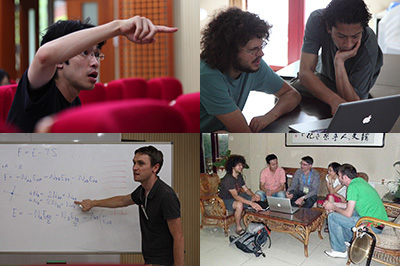Campus News
UC Santa Cruz hosts international summer program on exoplanetary atmospheres
The 2016 Kavli Summer Program in Astrophysics will focus on ‘Exoplanetary Atmospheres.’


The 2016 Kavli Summer Program in Astrophysics at UC Santa Cruz will focus on “Exoplanetary Atmospheres,” bringing together scientists and students from a broad range of backgrounds to tackle the multifaceted problem of understanding the atmospheres of exoplanets.
Founding director Pascale Garaud, professor of applied mathematics and statistics at UC Santa Cruz, said the six-week program combines the concept of a long-term workshop with graduate student training through research projects. Senior faculty, postdoctoral researchers, and graduate students will share ideas and work together on collaborative projects. Applications are now open for the 2016 program, which runs from June 20 to July 29.
Garaud, who started the program in 2010 as the International Summer Institute for Modeling in Astrophysics (ISIMA), said she is excited about the new partnership with the Kavli Foundation, which is providing $70,000 to support the 2016 program.
Enrico Ramirez-Ruiz, professor and chair of the UCSC Department of Astronomy and Astrophysics, expressed his commitment to making the program a landmark component of the department. “We are delighted to host this transformative program, which reflects Pascale’s unique vision for excellence in theoretical astrophysics,” he said.
Exoplanetary atmospheres
Jonathan Fortney, professor of astronomy and astrophysics at UC Santa Cruz and scientific director of the 2016 program on exoplanetary atmospheres, said it will cover a full spectrum of research topics for a wide range of planets.
“Exoplanetary science has tremendously expanded the scope of our thinking about what atmospheres can be made of, what kinds of planets can have or even lose atmospheres, and how we should best detect and characterize them,” Fortney said. “Today we are confronting a host of issues far beyond our solar system experience and intuition.”
The program will begin with a one-week workshop featuring introductory lectures by invited faculty and short contributed presentations. Innovative research projects for students will be developed during informal discussions and designated sessions, and students will team up with senior participants to work on their selected projects over the next five weeks of the program.
The location of future programs will alternate between UC Santa Cruz and other institutions worldwide. Previous programs have been held in Beijing, Toronto, and Santa Cruz. Garaud said the programs have been productive and have helped many participants make connections that led to postdoctoral positions and other opportunities. One of the participants in the Beijing program on star and planet formation, Xi Zhang, is now an assistant professor of Earth and planetary sciences at UC Santa Cruz.
“We have had some great success stories,” Garaud said. “I participated in a similar program in fluid dynamics as a graduate student, and that program was the single most valuable experience in my career, shaping the scientist I am today. I wanted to give students in astrophysics the same opportunity.”
More information about the Kavli Summer Program in Astrophysics is available online at kspa.ucsc.edu.